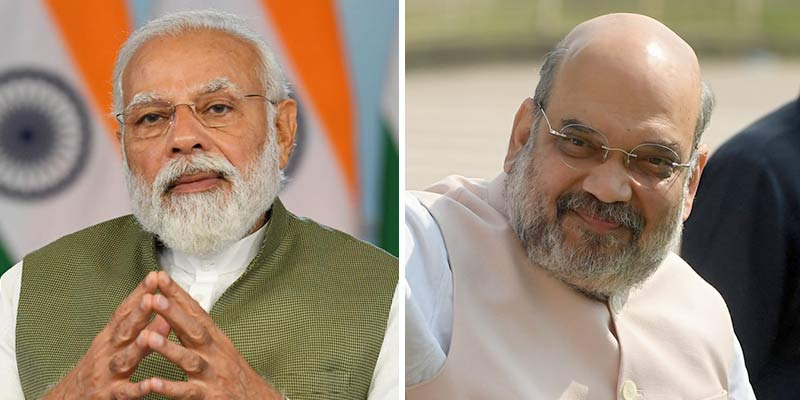- India
- May 25
Explainer / Inter-State Council
• The Inter-State Council, which works to promote and support cooperative federalism in the country, has been reconstituted with Prime Minister Narendra Modi as chairman.
• According to an official notification issued last week, 10 Union ministers will be permanent invitees to the Inter-State Council.
• The Union ministers who were made members of the council are: Rajnath Singh, Amit Shah, Nirmala Sitharaman, Narendra Singh Tomar, Virendra Kumar, Hardeep Singh Puri, Nitin Gadkari, S. Jaishankar, Arjun Munda, Piyush Goyal, Dhamendra Pradhan, Pralhad Joshi, Ashwini Vaishnaw, Gajendra Singh Shekhawat, Kiren Rijiju and Bhupender Yadav.
• The government has also reconstituted the Standing Committee of the Inter-State Council with Union Home Minister Amit Shah as chairman.
Inter-State Council
• Article 263 of the Constitution envisages establishment of an institutional mechanism for coordination of policies and their implementation among its constitutional units.
• Accordingly, the Inter-State Council (ISC) was set up through a Presidential Order on May 28, 1990.
• The Prime Minister is the chairman of the Council. Chief Ministers of all states and Union Territories (UTs) having Legislative Assemblies, Administrators of UTs not having Legislative Assemblies, governors of states under President’s Rule and Union ministers nominated by the chairman are members of the Council.
• The Inter-State Council Secretariat was set up in 1991. The Council Secretariat monitors the implementation of the recommendations made by the ISC, and places the Action Taken Report before the Standing Committee/ISC for consideration.
Why was Inter-State Council formed?
• The Constitution provides for a polity, which clearly defines spheres of authority between the Union and states to be exercised in the fields assigned to them. Consistent with this, the Constitution has made an elaborate distribution of powers between the Union and states in the areas of legislative, administrative and financial powers.
• The subject of Legislative Power has, accordingly, been classified into three Lists – Union List (List I), State List (List II) and the Concurrent List (List III) in the Seventh Schedule of the Constitution.
• Residuary powers of legislation have been vested in Parliament. The Union government has, from time to time, taken steps to look into the contentious issues between the Centre and states in the areas of distribution of powers.
• The Union government, constituted a Commission in 1988 under the chairmanship of Justice R.S. Sarkaria to review the working of the existing arrangements between the Union and states.
• One of the important recommendations of Sarkaria Commission was for establishing a permanent Inter-State Council as an independent national forum for consultation with a mandate well defined in accordance with Article 263 of the Constitution of India.
• Pursuant to the recommendation, the Inter-State-Council was set up in 1990.
Functions of the ISC
• The ISC has been assigned the duties of investigating and discussing such subjects in which some or all of the states, or the Union and one or more of the states have a common interest, and to make recommendations for better coordination of policy and action with respect to that subject.
• It deliberates upon such other matters of general interest of the states as may be referred to by the chairman to the Council.
• The mandate of the Council is to create a strong institutional framework to promote and support cooperative federalism in the country, and activate the Council and Zonal Councils by organising regular meetings.
• It also facilitates consideration of all pending and emerging issues of the centre-state and inter-state relations by the Zonal Councils and ISC and develop a sound system of monitoring the implementation of the recommendations of the ISC and Zonal Councils.
Standing Committee of the Inter-State Council
• The Standing Committee of ISC was constituted in the year 1996 for continuous consultation and processing of matters for the consideration of the Council.
• The Union Home Minister is the chairman of the Standing Committee.
• The composition of the standing committee of the Inter-State Council will be: Amit Shah (chairman) while members include Union ministers Nirmala Sitharaman, Narendra Singh Tomar, Virendra Kumar and Gajendra Singh Shekhawat.
• The chief ministers of Andhra Pradesh, Assam, Bihar, Gujarat, Maharashtra, Odisha, Punjab and Uttar Pradesh are also members of the Standing Committee of the ISC.
• The Standing Committee will have continuous consultation and process matters for consideration of the Council, process all matters pertaining to Centre-state relations before they are taken up for consideration in the ISC.
• The Standing Committee also monitors the implementation of the decisions taken on the recommendations of the Council and considers any other matter referred to it by the chairman or the Council.
• It may, if necessary, invite experts and persons eminent in specific fields to have the benefit of their views while deliberating upon the related subjects.
Manorama Yearbook app is now available on Google Play Store and iOS App Store

